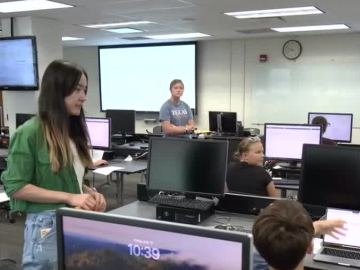WASHINGTON, D.C.—U.S. Senator Maria Cantwell (D-WA), chair of the Senate Committee on Commerce, Science, and Transportation, introduced on Friday, July 12, the Content Origin Protection and Integrity from Edited and Deepfaked Media Act (COPIED ACT), to combat the rise of harmful AI deepfakes. The bill would set new federal transparency guidelines for marking, authenticating, and detecting AI-generated content; protect journalists, actors, and artists against AI-driven theft; and hold violators accountable for abuses.
Cantwell leading a Senate Committee on Commerce, Science, and Transportation. SOURCE: Snapshot from YouTube video.
“The bipartisan COPIED Act I introduced with Senator Blackburn and Senator Heinrich will provide much-needed transparency around AI-generated content,” said Senator Cantwell. “The COPIED Act will also put creators, including local journalists, artists, and musicians, back in control of their content with a provenance and watermark process that I think is very much needed.”
The COPIED Act:
- Creates Transparency Standards: Requires the National Institute of Standards and Technology (NIST) to develop guidelines and standards for content provenance information, watermarking, and synthetic content detection. These standards will promote transparency to identify if content has been generated or manipulated by AI, as well as where AI content originated. The bill also directs NIST to develop cybersecurity measures to prevent tampering with provenance and watermarking on AI content.
- Puts Journalists, Artists, and Musicians in Control of Their Content: Requires providers of AI tools used to generate creative or journalistic content to allow owners of that content to attach provenance information to it and prohibits its removal. The bill prohibits the unauthorized use of content with provenance information to train AI models or generate AI content. These measures give content owners—journalists, newspapers, artists, songwriters, and others—the ability to protect their work and set the terms of use for their content, including compensation.
- Gives Individuals a Right to Sue Violators: Authorizes the Federal Trade Commission (FTC) and state attorneys general to enforce the bill’s requirements. It also gives newspapers, broadcasters, artists, and other content owners the right to bring suit in court against platforms or others who use their content without permission.
- Prohibits Tampering with or Disabling AI Provenance Information: Currently, there is no law that prohibits removing, disabling, or tampering with content provenance information. The bill prohibits anyone, including internet platforms, search engines, and social media companies, from interfering with content provenance information in these ways.
Full bill text and summary of the COPIED Act available HERE and HERE.
“We applaud Senator Cantwell for introducing legislation that helps identify legitimate news organizations while attacking the proliferation of fake news. Trusted, local news is vital to serving our communities and protecting our democracy. We look forward to working with Senator Cantwell and her staff to successfully address this critical issue,” said Alan Fisco, President and Chief Financial Officer of The Seattle Times.
The bipartisan legislation is also supported by SAG-AFTRA, the Nashville Songwriters Association International, the Recording Academy, National Music Publishers’ Association, Recording Industry Association of America, News/Media Alliance, National Newspaper Association, America’s Newspapers, Rebuild Local News, National Association of Broadcasters, Artists Rights Alliance, Human Artistry Campaign, Public Citizen, The Society of Composers & Lyricists (SCL), the Songwriters Guild of America (SGA), and Music Creators North America (MCNA).
Quotes provided by each of these organizations in support of the COPIED Act are available HERE.
SOURCE: Office of Maria Cantwell





